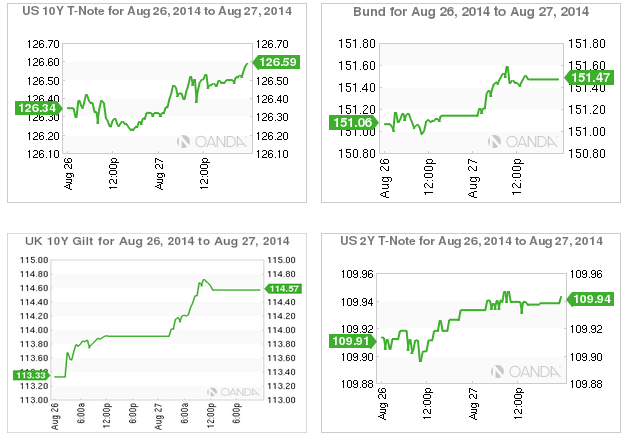- European yields have reached record lows after ECB expectations
- US Bonds have been caught up in the rise in demand driving US yields lower
- Emerging markets hurt as flows have pared back expecting Fed action

German bonds continue to rise along those of Spain and Italy. This is all the result of the European Central Bank president Mario Draghi’s address at the Jackson Hole Symposium in Wyoming. Even though the Federal Reserve Chair Janet Yellen was the main attraction she disappointed with a noncommittal speech. Draghi in contrast has been pushed from all sides to live up to his “whatever it takes” promise to defend the Euro. In this case it means fighting deflation as European prices continue to stagnate.
Germany which so far had been immune to the European slowdown seems to have caught the bug after tensions between Ukraine and Russia have affected business and consumer confidence. The european bonds have decreased their risk as the market is betting the ECB will live up to its unspoken promise. This has reduced risk in even countries that were near default 2 years ago.
With little risk there is also low reward. Investors in European bonds are looking for higher yields and even the record low yields in the US and Canada are deemed attractive. Which in turn will cause those yields to buckle under the strong demand. Yields in the US are supported by the upcoming end of QE in the fall as well as the Fed’s first interest rate hike in 2015. The timing is still unknown which is the current uncertainty driving bond prices as traders try to avoid being offside even as the lines are continuously moving.
The Argentinean bond default has not triggered a contagion in emerging markets. However the flow into EM has grinder to a stand still. The Institute of International Finance reported that portfolio flows into EM were $9 billion in August. The average in May, June, July was around $35 billion. Seasonal effects are in play, but there is dismissing the lower appetite for risk from investors. Given how the Fed, the ECB and the BOJ will probably intervene sooner rather than later the market is wary of higher than average risk. The Bank of England has been unpredictable and with a slower pace of recovery, but at least heading in the right path the economy of the UK might not need Governor Carney to be that reliable.
